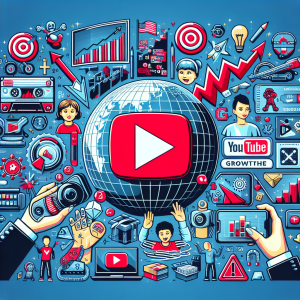Understanding the Power of Digital Marketing
Digital marketing, often referred to as online marketing, encompasses all marketing efforts that utilize an electronic device or the internet. It’s the process of promoting products, services, or brands using various digital channels. This is a broad term, and its methods are constantly evolving, making it crucial for businesses to stay informed and adapt to new trends.
Why is Digital Marketing Important?
From your website to your online branding assets, digital marketing encompasses all your online marketing efforts. Let’s explore why this type of marketing is crucial in today’s business landscape.
- Global Reach: Unlike traditional marketing, digital marketing allows you to reach a much larger audience, transcending geographical limitations. You can target specific demographics and interests, expanding your customer base significantly. Imagine a local bakery using social media to attract customers from across the country, or even internationally!
- Cost-Effectiveness: Internet marketing often proves to be more affordable than traditional marketing methods, especially for small businesses with limited budgets. You can run highly targeted campaigns with precise budget control, ensuring maximum return on investment. Pay-per-click (PPC) advertising, for example, lets you set daily budgets and only pay when someone clicks on your ad.
- Measurable Results: Digital marketing campaigns offer the advantage of real-time tracking and analysis. Tools like Google Analytics, SEMrush, and similar dashboards provide valuable insights into campaign performance. You can see exactly how many people visit your website, where they came from, what they do, and how many convert into customers.
- Personalized Engagement: Web marketing empowers businesses to tailor their messaging to specific customer segments, fostering more personalized interactions. You can create customized content, offers, and experiences based on user behavior and preferences. Think of personalized product recommendations on e-commerce sites or targeted email campaigns based on past purchases.
Exploring the Different Types of Digital Marketing
Digital marketing is an umbrella term encompassing various tactics and strategies. Here are some of the most common and effective types:
- Search Engine Optimization (SEO)
SEO focuses on increasing your website’s visibility in organic (non-paid) search engine results. By optimizing your web content, website structure, and off-page signals (like backlinks), you can attract more qualified traffic to your site. This includes keyword research, content creation, technical SEO, and link building.
- Search Engine Marketing (SEM)
SEM, often involving pay-per-click (PPC) advertising, helps businesses gain visibility on search engine results pages through paid campaigns. Google Ads is the most popular platform for SEM. You bid on keywords and pay each time someone clicks on your ad. This is a fast way to drive traffic and generate leads.
- Content Marketing
At its core, content marketing involves creating and distributing valuable, relevant, and consistent content. This strategy aims to attract and engage your target audience, ultimately driving profitable customer action. Content includes blog posts, videos, infographics, ebooks, and more. The goal is to build a strong brand and thought leadership.
- Social Media Marketing
Businesses use social media marketing to connect with their audience on platforms like Facebook, Instagram, Twitter, LinkedIn, TikTok, and others. This strategy can enhance brand awareness, build relationships, drive traffic to your website, and generate leads. Each platform has its own best practices, and a successful social media strategy should be tailored to the target audience and platform.
- Email Marketing
Email marketing remains a powerful tool for nurturing leads, promoting products or services, and building customer loyalty. You can segment your email list based on interests and behavior and send targeted messages to drive conversions. Newsletters, promotional emails, and abandoned cart reminders are common examples.
- Affiliate Marketing
Through affiliate marketing, businesses partner with third-party publishers (affiliates) to promote their products or services and earn a commission on resulting sales. The affiliate promotes the product on their website or social media and earns a percentage of each sale made through their unique tracking link.
Reaping the Benefits of Digital Marketing
Implementing a comprehensive digital marketing strategy can yield numerous benefits for your business. These benefits include:
- Increased Brand Awareness: Online marketing increases your brand’s visibility, ensuring you remain top-of-mind with your target audience.
- Improved Lead Generation: Digital marketing provides effective avenues for capturing leads and nurturing them through the sales funnel. Using forms, landing pages and CTAs.
- Enhanced Customer Engagement: By creating valuable content and engaging with your audience on social media, you can foster stronger customer relationships.
- Increased Sales and Conversions: Ultimately, a well-executed digital marketing strategy drives more sales and conversions. Tracking and optimizing the conversion funnel is key to maximize results.
Business Application: Business Growth Lessons for Commercial B2B clients
The Challenge: Many B2B companies struggle to generate qualified leads and convert them into paying customers. They may lack a clear digital marketing strategy, effective content creation, or a strong online presence, hindering their growth.
Our Solution: Interstellar Design provides comprehensive digital marketing services, including SEO, content marketing, social media management, and paid advertising. We help B2B clients build a strong online presence, attract their ideal customers, and generate qualified leads through our proven B2B marketing strategies and tactics. We excel at developing a results-oriented digital marketing strategy.
Why It Matters: A robust digital marketing strategy directly impacts your revenue and market share. By effectively reaching your target audience, nurturing leads, and driving conversions, you can accelerate business growth and outperform your competitors.
Next Steps: Ready to grow your business online? Schedule a consultation with Interstellar Design today.







